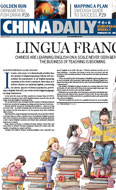Society
Italy: New program looks at biosecurity
Updated: 2011-02-24 11:16
(Agencies)
MILAN - The threat is all too real, experts say: foreign insects introduced in an area with no natural defenses with the aim of destabilizing the economy, food supply or both.
A new euro6 million ($8.2 million) project funded by the European Commission will study both how to prevent and respond to biological threats to the world's crops and forests.
| ||||
Nazi Germany studied deploying the Colorado Potato Beetle against Britain during World War II to wipe out potato crops, and it is not far fetched to imagine terrorists in a multipolar world considering similar acts, organizers said.
But the existence of the Plant and Food Biosecurity project, based at the University of Turin, is not meant to create alarm. Many of the responses that will be studied can also be used to prevent and identify the natural but potentially destabilizing migration of insects and pests, said director Maria Lodovica Gullino.
"In our normal global commercialization, parasites travel with high velocity from one country to another. Consider the problems if a criminal or terrorist thinks of using a seed as a means of biological warfare," Gullino said.
The project will consider both the risk of introduction of plant parasites as well as human pathogens that colonize plants, such as the spread of E. coli to spinach.
"If you think about all of the food riots and some of the uprisings in the Middle East, part of the basis for those are higher food prices. Not all are due to plant diseases, but plant diseases are part of that," said Jacqueline Fletcher, director of a national institute for food and agricultural biosecurity at Oklahoma State University, who is participating in the project.
The importance of crops is all relative, she said, noting that Americans have other dietary choices if a potato crop is wiped out.
"But if you wipe out rice in Southeast Asia, that is something that upsets the political framework," Fletcher said.
E-paper

Chinese tourists as top shoppers
Since last summer, Chinese tourists emerged as the top tax-free shoppers in Europe.
Golden run ahead
Looking abroad
Mapping out a plan
Specials

The green lantern
Environmental concerns are shedding new light on a colorful tradition

Inland interchange
Chongqing bets on its position as a hub for China's west.

Zooming in on Chinese skies
Helicopter companies ride on country's growing interest in luxury aviation.


